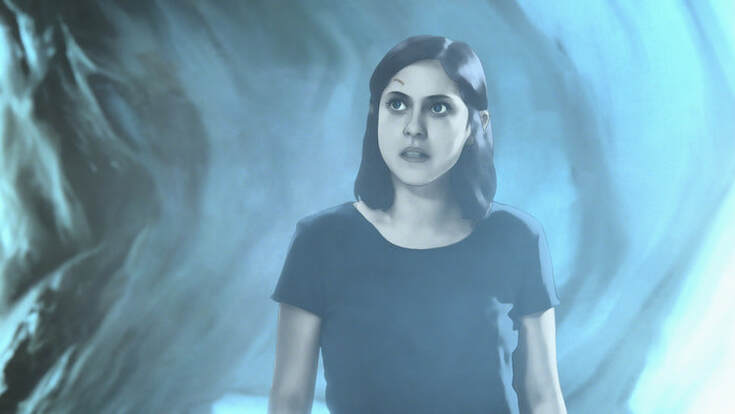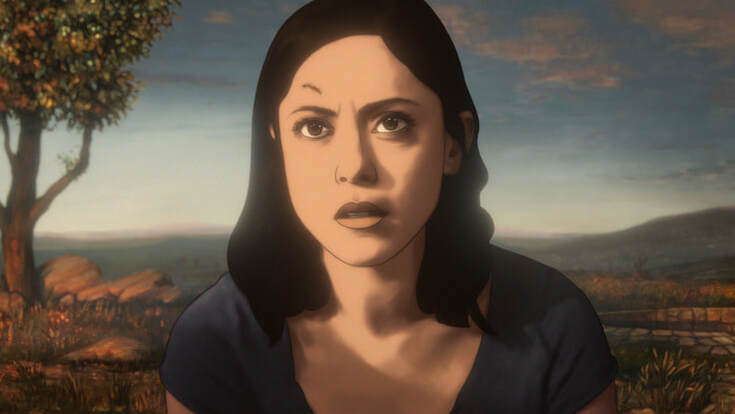|
Interview by Sean Boelman
Created by Raphael Bob-Waksberg and Kate Purdy, two of the minds behind Bojack Horseman, Undone is a fascinating sci-fi adult animation show on Prime Video. Season one posed some interesting questions, and now season two expands upon them in thought-provoking ways you wouldn’t expect.
We at disappointment media got the opportunity to talk with Rosa Salazar, lead actress and producer of season two of the show, also known for starring in fan-favorite Alita: Battle Angel. In the interview, we talk about acting for performance capture, the complex themes of the series, and more. Check it out below! On Working With Performance Capture
disappointment media: So you've done quite a bit of work at this point with motion capture performances. What about motion capture performances do you like working with?
Rosa Salazar: So Jon Landau, who produced Alita who's just like an OG producer, would kill me, if I said motion capture. [She laughs.] I'd get a stern phone call. "It's performance capture!" That's what he would yell at me on the phone. It's been drilled into my head at this point. So performance capture is what I did on Alita and rotoscope animation, I would call it also performance capture. It is more motion capture than performance capture, because they don't have two high definition cameras five inches from my face. But what I love about acting, and then grouping that work with CGI artists, rotoscope animators, and traditional animators is that I get to exist freely. Those two methods are incredibly different: performance capture for Alita and rotoscope animation, the acting is very, very, very different. For Undone, it's so amazing, because we don't have makeup touches. We don't have someone coming in and straightening out your shirt. We're not worried about the wrinkles on your shirt, or the unkemptness of your hair. We don't have a lot of wardrobe changes because it is a cartoon, after all, a cartoon closet. We wear the same thing every day. There's no major light changes. There aren't incredibly intricate camera changes. So you are totally free to exist within the moment. And with rotoscope animation, it's incredibly challenging physically, emotionally, mentally. Just to compare, on something like Alita, it's such a behemoth. It's such a slow moving beast, you have a lot of technology, people running around doing certain things, you have major changes in camera and location, and you have a lot going on. So you have a lot of downtime. Something like Undone, you have zero downtime. You never sit in your cast chair, you have a 30 minute lunch, and you go right back to work. And when you are working, you are working. On something like Alita, maybe you do an eighth of a page, four pages, and that's working with someone like Robert Rodriguez, who knows exactly what he needs, doesn't waste time. And on something like Undone, you could shoot anywhere from 10 to 20 pages a day. So on any given day, you can go on an emotional roller coaster of breaking up with your boyfriend, seeing your dead father, having a falling out with your sister, having a falling out with your mother, getting into a car accident, seeing the expanse of the universe, all in one workday. When you go to your job, do you have to do such a crazy emotional upheaval day after day after day? I mean, it's incredibly challenging. And because we have no downtime, you are working at a rapid clip. So that's what I love about it. I love that it's uninterrupted. So you're really in the flow, and you really get to this meditative state with it, and it's just divine. disappointment: So in interviews for season one, you talked about some of the challenges of shooting that performance capture type performance in the rooms of green screens. Was it any easier or different to approach Season Two after having the experience of season one under your belt? Salazar: Yes, it was different. So Hisko Hulsing, who is the amazing director behind Undone, puts it the best way. He's like, "Season one, it was like no one really knew what we were doing yet. We were building a car while learning to drive it." And then it came out, it was very special. We're like, "Okay, we got this!' And then season two, he's like, "Man, now we have a Maserati. Let's put the top down and put it on cruise control!" And then the pandemic hit. So we had to, you know, build a new car. So It was different doing season two, even though we had all of this intelligence that we accrued from doing season one, we had to bob and weave with the changing landscape of time. We had to be fluid, but that is the nature of Undone is sort of learning how to drive the car while you're building it anyway. So even the education in doing that, and doing the unknown really dovetails nicely into the work itself. Now with COVID and season two, things changed dramatically. We were stripped down from like 20 people on set to around six to eight people on set. We had just the actors, the cameraman, our AD, Patrick Metcalf. All of our producers and our directors and our animators were on Zoom. We had our COVID Officer, Ron — shout out to Ron, he was awesome. And that was it. And it was me and Angelique [Cabral] mainly on the set, just us and so it created a more intimate vibe, and honestly, I think, more efficient vibe. Because you don't have people walking in and out of the room. It was like a pressure cooker. But having done season one, we could do season two, had we not done season one? I'm sure we could have pulled it off, but it would have been a lot more of an endeavor. On How This Season Takes The Show Further
disappointment: You mentioned the intimacy, I really felt this in the new season, how it kind of expands upon these themes that are very tender themes like mental health, generational trauma. Why do you think it's important for these themes to be discussed in projects like this?
Salazar: Catharsis. That's why it's important: catharsis. Very plainly put, to tell other people that you are not alone, that this is a human condition. And we take it a step further and say, even if you could go back in time, yesterday, last month, three years ago, all the way back to, let's say, my father's father's father, an indigenous man in Peru, and you could go all the way back, the same problems would persist. It is a human condition, no matter how far back, no matter the context, no matter the time period. It's important to remind people that we're human, that we're fallible, that we have secrets, that we make decisions, that we make choices and our choices, whether the intention is good, or what have you, those are choices that are made for a reason. And I think it's important to talk about things like choices because people spend a lot of time and regret, and shame and guilt. And I think it's important to highlight that we're all just doing our damn best out here. And when we talk about things like mental illness, I think it's incredibly important. Look at the way we talk about Kanye West. Look at the horrible way we talk about a man who is openly unwell. We call him crazy, we call him insane, then we will turn around call him a genius and the greatest of all time, but then we make fun of him for having very public mental breakdowns. The conversation, I can't believe it, is just beginning around mental health, mental illness, and it's just really, really important that we discuss it in general. I can't believe it still has a taboo around it when most of us suffer. And I think it's important to show a character like this, who is mixed race, who is a woman dealing with some sort of behavioral illness. I mean, we're still on the fence, right? Is she unwell or does she have shamanic abilities? We're still asking that question and to me, in my opinion, It's somewhere in the middle, like it's a combination of the two. I love that Undone forces these questions. Maybe you can't have one without the other. We talk about Kanye again. Maybe you can't have this genius without some level of like, if you can perceive so much more, if you can see more and feel more, then wouldn't that lend itself to a creative brain? Or can we be well and still have this magic? And I think we're still scratching the surface of that question, not even the answer in Undone. And that's what I love about it. And that's why it's so important, because it really isn't about answering the question. It isn't really isn't about being like, "And this is mental illness, educationally." It's more about being curious. disappointment: So for season two, you also served as a producer on Undone. What kind of inspired you to take this step into being a producer in addition to starring in the show for the second season? Salazar: Well, I think speaking of representation, I think it's incredibly important when you have a Latin female lead of a show going into its second season, knowing all of the work that you already put in as the lead of a show, to get recognition for that was a huge boon for me. And also just mad respect for Amazon, mad respect for Tornante, and all of the producers in the team for recognizing the hard work that leads of a show do. I mean, you are the anchor to the ship, and as a lead, you are already doing so much. So it was a big, big sign of respect from Amazon, and I can't thank them enough for recognizing that work and for really putting their money where their mouth is, and being like, here's someone we absolutely respect, who does great work for us. I do go above and beyond and they're like, "And you should be recognized for that." So it was really Amazon who did that. I may be freelance as an actor, but I'm not someone who just rocks into work and is like, "Hey, what's up," like, I really throw my entire self and body into it. And so that was really Amazon, recognizing that and saying, "You deserve this." And it's incredibly important to, to represent that. this is totally off, you know, topic, but when I was watching Only Murders in the Building, to see executive producer Selena Gomez made me cry every time. I mean, it's incredibly important. And it affects me and I'm in this business working at a high level and when I see that, I get really inspired.
Season 2 of Undone streams on Amazon Prime beginning April 29.
0 Comments
Leave a Reply. |
Archives
March 2024
Authors
All
|
|
|
disappointment media
Dedicated to unique and diverse perspectives on cinema! |


